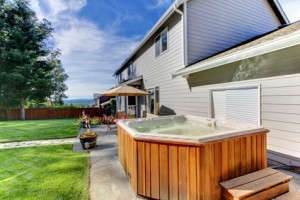 It’s considered something of a luxury, and there’s little wonder why: Hot tubs aren’t exactly cheap. Depending on the size and other details, it may cost well over $1,500 for the tub alone. (Some outdoor, in-ground models can run $20,000.)
It’s considered something of a luxury, and there’s little wonder why: Hot tubs aren’t exactly cheap. Depending on the size and other details, it may cost well over $1,500 for the tub alone. (Some outdoor, in-ground models can run $20,000.)
Then there’s electricity and other needs, not to mention installation, delivery, preparing an area for it, and anything else you desire.
But having a hot tub increases your home’s value, right? Well, maybe not. It does have certain advantages, however.
How Does a Hot Tub Affect Your Home Value?
There’s no single rule for calculating how much installing a hot tub will increase the value of a given home – if it does at all. Some hot tubs may, depending on various factors.
- Is it a portable hot tub? So-called “portable” hot tubs are, as a rule, considered personal property and as such offer no added value to the house and land. And what is a portable hot tub? Any hot tub displayed on a showroom floor is a portable hot tub. It can be moved and relocated even if it is heavy and requires special equipment to deliver it to your home. Contrast portable hot tubs with permanent hot tubs: A permanent hot tub sits in the ground, much like an in-ground swimming pool. The plumbing is typically built-in as well. An in-ground hot tub may increase your home value, although generally not as much as you invested in the tub.
- Is the hot tub built-in? Even a “portable” hot tub may add real value to your home if it’s built-in. If removing the tub will cause extra construction to close or cover the hole in the deck, patio, wall or such, then it is considered built-in and may increase the home appraisal. Even then, the exact amount may vary.
- Where do you live? The climate you live in also influences the affect a hot tub may have on property value. In northern climates, for instance, outdoor swimming pools don’t always get much use. It’s simply too cold most of the year. A hot tub, on the other hand, is a pleasant retreat in the coldest of winters – even if it is outdoors.
Residents of hot, southern climates probably won’t appreciate a hot tub in the same way. In such markets swimming pools will likely raise your home value more than a hot tub.
Calculating Your Hot Tub’s Value
Sometimes value is difficult to calculate. For some homeowners, the cost of installation or lack of resale value is secondary to the comfort and benefits of having a hot tub.
Even when they don’t increase property value, hot tubs have another real benefit: They generate interest. Homes with hot tubs may get more inquiries when the home is up for sale.
To calculate a ballpark estimate of your hot tub’s value once installed, the best thing to do is to consult a certified home appraiser. Real estate professionals may also be of assistance. They are aware of home value trends in your area at any given time and likely know if comparable homes in your neighborhood feature hot tubs. (If they do, then not having a hot tub could actually detract from your home value.)
How to Increase the Value of Your Hot Tub
When it’s time to sell your home, of course you want it to look as nice as possible. Spruce up your hot tub to make it more appealing to potential homebuyers:
- Replace old or damaged hot tub covers. Simply changing the cover can make a hot tub look more inviting.
- Clean the tub thoroughly. Depending on the material, wash and shine the exterior. Wipe down the interior to remove algae, stains or other problems, and chemically treat the water or even change the water if necessary. Remove any debris in and on the hot tub before any home viewings.
- Landscape around outdoor hot tubs. Present your spa area as a tempting retreat from the surrounding world. Build a fence to shelter it from neighbors, install mood lighting, plant greenery, make a brick or concrete path leading to the tub – anything that will help blend the tub into the home environment and increase appeal.
In the final analysis, if you’re struggling with the thought of spending the money on a hot tub, ask yourself how long you plan to remain in your home. If you can’t foresee selling and moving for a number of years, the actual financial return may be secondary to your enjoyment in the meantime.
